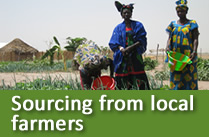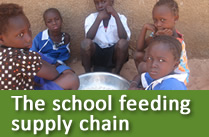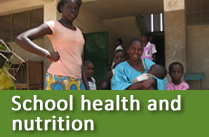Welcome to HGSF-Global.org/nigeria
In 2004, with the backing of the African Union and World Food Programme, Nigeria was part of the first wave of countries to implement a new and innovative Home Grown School Feeding and Health Programme pilot.
Employing the legislation of the Universal Basic Education Act the Federal Government rolled out a pilot scheme in 13 of the country states to implement school feeding programmes which supported agricultural development by procuring and using locally grown food. Jump forward 10 years and only two states, Osun and Kano, are still feeding their school children.
During this decade, the Osun State HGSF programme, known locally as O-Meals, has gone from strength to strength, serving up over 250,000 hot, nutritious and locally sourced meals every school day. The positive impact of this has been felt not only in the schools where enrolments have gone up by 28%, but also by the state's economy which has benefited from over 3,000 new jobs being created in the school feeding supply chain and over 600 poultry farmers, 2,000 fish farmers and 2,000 cocoyam farmers among others supplying the programme.
School feeding’s role in supporting agricultural development and educational achievement is to be the central topic of an address by H.E. Ogbeni Rauf Argebesola, Govenor of Osun State, Nigeria, leading experts and British parliamentarians at a special event in the UK’s House of Commons on Wednesday 22nd January.
The Governor has been invited by the All Party Parliamentary Group (APPG) on Agriculture and Food for Development and the Partnership for Child Development (PCD) Imperial College London, to speak at a meeting attended by development experts focusing on the evolution and improvement of government-led Home Grown School Feeding (HGSF) programmes in low and middle income countries which feed school children using food grown locally by smallholder farmers.
Read more: H.E. Rauf Aregbesola to Address UK Parliamentarians on HGSF in Nigeria
Representatives from Kano State, Nigeria’s Ministry of Agriculture, Ministry of Health and the Federal Ministry of Agriculture and Rural Development (FMA&RD) recently attended a workshop focused on redesigning Kano State Nigeria’s school feeding programme into a structured HGSF model.
The workshop, held on December 5 organised by the Partnership for Child Development (PCD) and the Kano State's Community Reorientation Committee (CRC) looked at the potential benefits and opportunities of HGSF in the State and focused on linking ministries with various technical capacities to ensure optimal programme efficiency.
Kano State's Commissioner for Agriculture, Dr Baraka Sanni stated that “Identifying the technical needs of the Kano School Feeding Programme, (KSFP) to ensure its efficiency and sustainability is of paramount importance”.
Read more: Kano State, Nigeria Prepares to strengthen HGSF Programme Implementation
To mark Global Handwashing Day 2013 in Osun State, Nigeria Partnership for Child Development, UNILEVER and Osun State Government organised a day of celebration seeing over 650 school-age children from 37 secondary schools alongside artisans and market women take part in community awareness raising activities on the impact of handwashing with soap on child survival and the prevention of life threatening diseases.
Speaking at the ceremony, Governor of Osun State, Ogbeni Rauf Aregbesola said, “Sickness and diseases are primarily caused by what we eat, hygiene and the state of our environment. It is therefore important to wash our hands with soap at critical times during the day.”
In order to promote experience sharing and build on knowledge in best practice HGSF implementation, officials from Ghana’s School Feeding Programme (GSFP) and Nigeria’s Osun State School Feeding and Health (O’Meals) programme recently took part in an exchange visit where they learnt from each countries’ school feeding programmes.
“School Feeding programmes are a potent tool to transform an economy if actors play their roles responsibly,” said Francis Yaw Gyarko, Deputy National Coordinator for GSFP Operations addressing officials at the exchange. He continued, “It therefore befits us to invest in (children) the future leaders so that Africa and developing countries as a whole would be free from illiteracy, hunger and poverty”.
Read more: PCD Takes Part in West African Exchange to Advance HGSF Programmes in Ghana and Nigeria
More Articles...
Page 2 of 4








